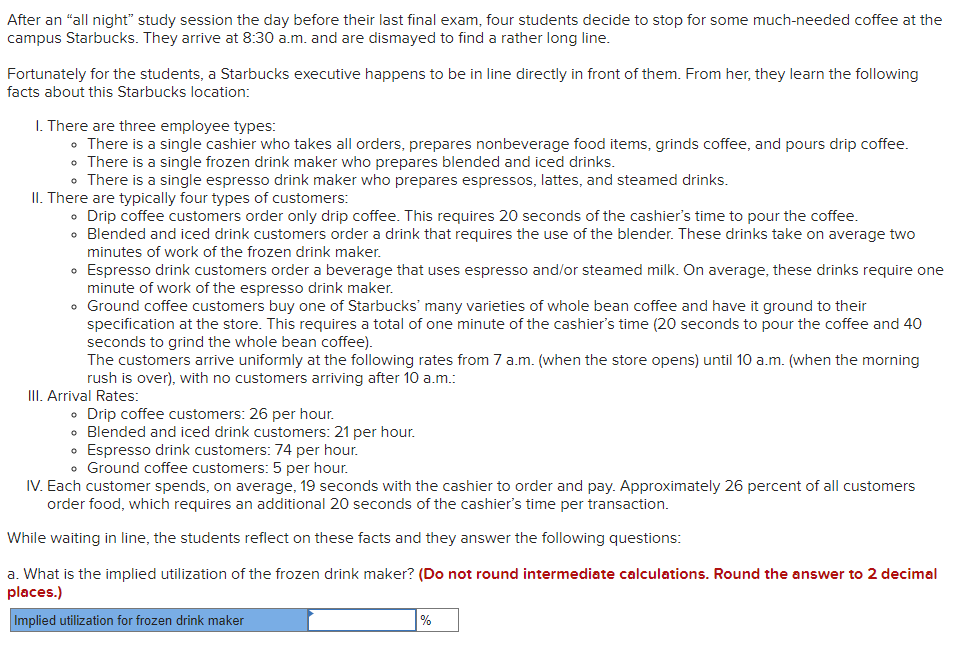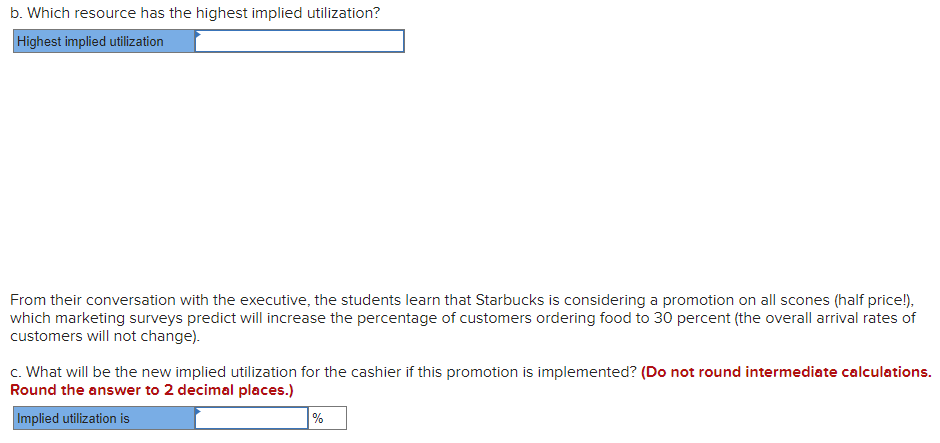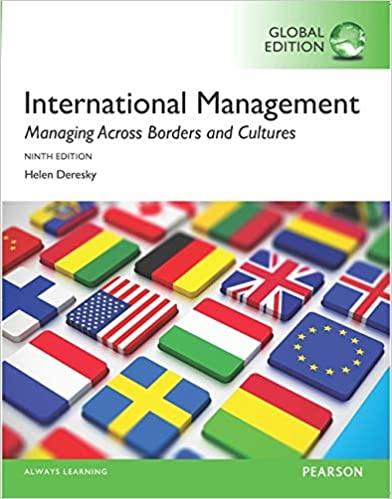Answered step by step
Verified Expert Solution
Question
1 Approved Answer
After an all night study session the day before their last final exam, four students decide to stop for some much-needed coffee at the campus

 After an "all night" study session the day before their last final exam, four students decide to stop for some much-needed coffee at the campus Starbucks. They arrive at 8:30 a.m. and are dismayed to find a rather long line. Fortunately for the students, a Starbucks executive happens to be in line directly in front of them. From her, they learn the following facts about this Starbucks location: I. There are three employee types: - There is a single cashier who takes all orders, prepares nonbeverage food items, grinds coffee, and pours drip coffee. - There is a single frozen drink maker who prepares blended and iced drinks. - There is a single espresso drink maker who prepares espressos, lattes, and steamed drinks. II. There are typically four types of customers: - Drip coffee customers order only drip coffee. This requires 20 seconds of the cashier's time to pour the coffee. - Blended and iced drink customers order a drink that requires the use of the blender. These drinks take on average two minutes of work of the frozen drink maker. - Espresso drink customers order a beverage that uses espresso and/or steamed milk. On average, these drinks require one minute of work of the espresso drink maker. - Ground coffee customers buy one of Starbucks' many varieties of whole bean coffee and have it ground to their specification at the store. This requires a total of one minute of the cashier's time (20 seconds to pour the coffee and 40 seconds to grind the whole bean coffee). The customers arrive uniformly at the following rates from 7 a.m. (when the store opens) until 10a.m. (when the morning rush is over), with no customers arriving after 10 a.m.: III. Arrival Rates: - Drip coffee customers: 26 per hour. - Blended and iced drink customers: 21 per hour. - Espresso drink customers: 74 per hour. - Ground coffee customers: 5 per hour. IV. Each customer spends, on average, 19 seconds with the cashier to order and pay. Approximately 26 percent of all customers order food, which requires an additional 20 seconds of the cashier's time per transaction. While waiting in line, the students reflect on these facts and they answer the following questions: a. What is the implied utilization of the frozen drink maker? (Do not round intermediate calculations. Round the answer to 2 decimal places.) b. Which resource has the highest implied utilization? From their conversation with the executive, the students learn that Starbucks is considering a promotion on all scones (half price!), which marketing surveys predict will increase the percentage of customers ordering food to 30 percent (the overall arrival rates of customers will not change). c. What will be the new implied utilization for the cashier if this promotion is implemented? (Do not round intermediate calculations. Round the answer to 2 decimal places.)
After an "all night" study session the day before their last final exam, four students decide to stop for some much-needed coffee at the campus Starbucks. They arrive at 8:30 a.m. and are dismayed to find a rather long line. Fortunately for the students, a Starbucks executive happens to be in line directly in front of them. From her, they learn the following facts about this Starbucks location: I. There are three employee types: - There is a single cashier who takes all orders, prepares nonbeverage food items, grinds coffee, and pours drip coffee. - There is a single frozen drink maker who prepares blended and iced drinks. - There is a single espresso drink maker who prepares espressos, lattes, and steamed drinks. II. There are typically four types of customers: - Drip coffee customers order only drip coffee. This requires 20 seconds of the cashier's time to pour the coffee. - Blended and iced drink customers order a drink that requires the use of the blender. These drinks take on average two minutes of work of the frozen drink maker. - Espresso drink customers order a beverage that uses espresso and/or steamed milk. On average, these drinks require one minute of work of the espresso drink maker. - Ground coffee customers buy one of Starbucks' many varieties of whole bean coffee and have it ground to their specification at the store. This requires a total of one minute of the cashier's time (20 seconds to pour the coffee and 40 seconds to grind the whole bean coffee). The customers arrive uniformly at the following rates from 7 a.m. (when the store opens) until 10a.m. (when the morning rush is over), with no customers arriving after 10 a.m.: III. Arrival Rates: - Drip coffee customers: 26 per hour. - Blended and iced drink customers: 21 per hour. - Espresso drink customers: 74 per hour. - Ground coffee customers: 5 per hour. IV. Each customer spends, on average, 19 seconds with the cashier to order and pay. Approximately 26 percent of all customers order food, which requires an additional 20 seconds of the cashier's time per transaction. While waiting in line, the students reflect on these facts and they answer the following questions: a. What is the implied utilization of the frozen drink maker? (Do not round intermediate calculations. Round the answer to 2 decimal places.) b. Which resource has the highest implied utilization? From their conversation with the executive, the students learn that Starbucks is considering a promotion on all scones (half price!), which marketing surveys predict will increase the percentage of customers ordering food to 30 percent (the overall arrival rates of customers will not change). c. What will be the new implied utilization for the cashier if this promotion is implemented? (Do not round intermediate calculations. Round the answer to 2 decimal places.) Step by Step Solution
There are 3 Steps involved in it
Step: 1

Get Instant Access to Expert-Tailored Solutions
See step-by-step solutions with expert insights and AI powered tools for academic success
Step: 2

Step: 3

Ace Your Homework with AI
Get the answers you need in no time with our AI-driven, step-by-step assistance
Get Started


